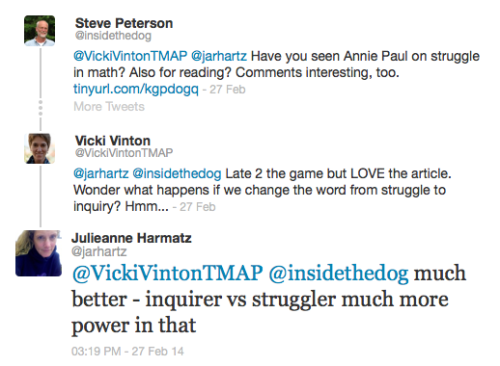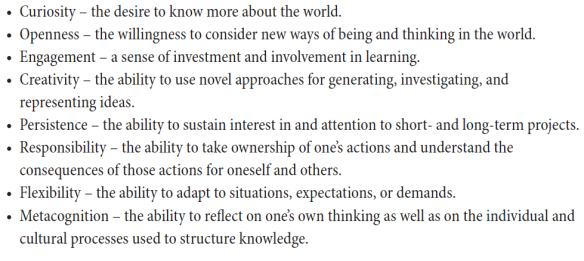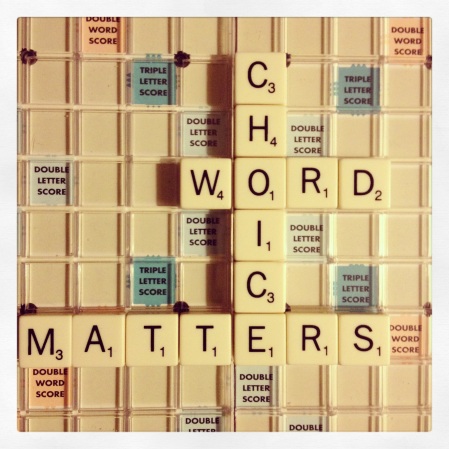
As happened last year, many of the teachers, administrators and parents who left feedback on last month’s English Language Arts test at testingtalk.org pointed to what they felt were questions that focused on minutiae which, as Brooklyn principal Liz Phillips said “had little bearing on [children’s] reading ability and yet had huge stakes for students, teachers, principals and schools.” Most of those questions were aimed at assessing the Common Core’s Reading Standards 4-6, which are the ones that look at word choice and structure. Having not seen this year’s tests, I’m not in a position to comment—though if the questions were like the ones I shared from some practice tests earlier, I can see what the concern was about.
Most of the practice test questions associated with those standards were, indeed, picayune and disconnected from the text’s overall meaning. But I don’t think that means that thinking about word choice and structure isn’t important—only that the test questions weren’t very good. Word choice and structure can, in fact, be windows onto a text’s deeper meaning. Or as my colleagues Clare Landrigan and Tammy Mulligan have suggested, thinking about Reading Standards 4-6 can get us to Standards 1-3, which are all about meaning. And so this week, I’d like to apply Reading Anchor Standard 4—”Interpret words and phrases as they are used in a text, including determining technical, connotative, and figurative meanings, and analyze how specific word choice shape meaning or tone”—to three key buzzwords attached to the Standards—rigor, grit and productive struggle.
 To me, all three seem to have strangely negative connotations. And in that, I’m not alone. Many educators have pointed out that, if we look up the word rigor in the dictionary, we find definitions that suggest something downright punishing. That’s why some educational writers, such as Stevi Quate and John McDermott, the authors of Clock Watchers, deliberately decided to use the word challenge instead of rigor in their most recent book The Just-Right Challenge. Others, such as former NCTE president Joanne Yatvin prefer the word vigor, which turning to the thesaurus this time, lists synonyms such as energy, strength, gusto and zing. Either or both of those words seem better than one connected to stiff dead bodies—i.e., rigor mortis. Yet rigor is the word that’s most in vogue.
To me, all three seem to have strangely negative connotations. And in that, I’m not alone. Many educators have pointed out that, if we look up the word rigor in the dictionary, we find definitions that suggest something downright punishing. That’s why some educational writers, such as Stevi Quate and John McDermott, the authors of Clock Watchers, deliberately decided to use the word challenge instead of rigor in their most recent book The Just-Right Challenge. Others, such as former NCTE president Joanne Yatvin prefer the word vigor, which turning to the thesaurus this time, lists synonyms such as energy, strength, gusto and zing. Either or both of those words seem better than one connected to stiff dead bodies—i.e., rigor mortis. Yet rigor is the word that’s most in vogue.
The word grit is also popular today and is frequently touted as “the secret to success.” Yet it, too, has a whiff of negativity about it. Grit is what’s needed to get through something
 unpleasant, boring or even painful that someone else has said is good for you—like eating your vegetables or sitting through days and days of standardized testing. And as Alfie Kohn notes in his great piece “Ten Concerns about the ‘Let Them Teach Grit’ Fad,” grit seems connected to a slew of other terms, like self-discipline, will power and deferred gratification, all of which push students to “resist temptation, put off doing what they enjoy in order to grind through whatever they’ve been told to do—and keep at it for as long as it takes.”
unpleasant, boring or even painful that someone else has said is good for you—like eating your vegetables or sitting through days and days of standardized testing. And as Alfie Kohn notes in his great piece “Ten Concerns about the ‘Let Them Teach Grit’ Fad,” grit seems connected to a slew of other terms, like self-discipline, will power and deferred gratification, all of which push students to “resist temptation, put off doing what they enjoy in order to grind through whatever they’ve been told to do—and keep at it for as long as it takes.”
Here, too, we could choose another word, like resilience, without the same connotations as grit, but we don’t. According to Merriam-Webster again, resilience focuses on “the ability to recover from or adjust easily to misfortune or change,” not just the stamina or toughness to trudge through it. And as former principal and speaker Peter DeWitt notes in his EdWeek blog post “Should Children Really Be Expected to Have Grit?“, resilience “can coincide with empathy and compassion,” whereas grit seems more about sheer doggedness—and in the case of vegetables and tests, compliance, which may be the word’s hidden agenda.
And then there’s the term productive struggle, which I confess I’ve embraced in the past, as an earlier blog post attests to. I believe completely in giving students time to explore and wrestle with a text in order to arrive at their own meaning because whatever is learned through that process—about that text, texts in general, and the reader himself—will stick much more than if we overly direct or scaffold students to a pre-determined answer. But that word struggle comes with the same negative connotations as the two other words do. The thesaurus, for instance, lists battle and fight as synonyms for struggle, with pains and drudgery as related words. And while I think we can reclaim words—such as turning the word confusion into something to celebrate rather than avoid—I’ve recently started to wonder if we shouldn’t choose a more positive word to get at the same concept, as you’ll see in the twitter exchange I had with two teachers after reading a blog post by the wonderful Annie Paul: 
Merriam-Webster defines inquiry as “a systematic search for the truth or facts about something” and unlike the word struggle, which seems mostly connected to hardship and conflict, the word inquiry is connected to questioning, challenge and self-reflection. In fact, it seems to embrace the very habits of mind that NCTE has identified in their Framework for Postsecondary Success:

So what does it say about our culture that the words we’ve chosen to latch on to the most all seem to carry connotations of hardship, toughness and forbearance? Some writers, like Alfie Kohn, see this as simply a new manifestation of the Puritan work ethic—in a time in which it’s become much harder to pull yourself up by your own bootstraps. Others, like P. L. Thomas of Furman University, sees in the “‘grit’ narrative” something much more insidious: “a not-so-thinly masked appeal to racism”, with students of color being tagged as the ones most in need of more rigor, grit and time spent struggling.
In addition to these troubling implications, these three words also focus on student deficits, not on student strengths. And they suggest that we, as teachers, should be like Catwoman with her scowl and her whip, rather than like the Cat Lady who invites children to get to know the kitties. And I can’t help thinking that if, as a society, we chose some of those other words from the NCTE Framework instead—such as curiosity, openness, creativity and engagement—students would engage in productive struggle, even with something deemed rigorous, without explicit lessons on grit. And that’s because . . .


Brilliant – thank you for sharing this. My students who “struggle” with the “rigors” it takes to develop “grit” already have enough of a negative view of their own abilities and capabilities in the classroom. I am excited to bring more a conscientious intentionality to the diction that I use in my instruction. I appreciate your eloquent appeal for more of this.
Thanks, Glen. It seems to me that students are just as apt to develop persistence by engaging and truly understanding texts they can access than by being thrown into the deep end of the pool. All too often the latter only confirms the negatives views some students have about themselves as readers. And I think we’re all more likely to persevere when we have some idea of what the pay-off is—and feel good about how we got there.
I’m printing this post to tuck into my copy of Choice Words. I’m pretty sure Peter Johnston would agree with you! When I do my annual re-read of Choice Words and Opening Minds, I’ll include your post. This makes a nice little text set on a TEACHER’S word choice!
Love the idea of an annual Peter Johnston re-read. Sounds good for the soul—and the heart. And hurray for NCTE!
Totally agree! I think by drilling down to the other (less used) meanings of rigor you might see how the word may work, (EX: believability, credibility, credibleness; the quality of being believable or trustworthy) but as Diane Ravitch points out, “Why are all the words from reformers so mean? These are our children.” She has a chapter dedicated to the language of the reformers in her book “Reign of Error”. All this proves is that he or she who controls the language controls the game! PS: When my post on this topic (http://usedbooksinclass.com/2013/09/03/inconceivable-rigor/) linked to Twitter, some guy posted back as Inigo Montoya and told me I do not know what the word “inconceivable” means!
Wish I had remembered your post on rigor, Colette; I would have linked back to it! Guess it’s another of instance of like minds thinking alike.Your comment also reminds me that it’s easier to forget that children are children if we always call them students. And on an entirely different note—I loved your post on the page 17 rule–http://usedbooksinclass.com/2014/04/15/the-17-minutepage-17-rule-what-the-book-will-really-be-about/! I haven’t had the time to pull some books from the shelf and test it out myself, but I have no doubt that something changes if you stick with a book that long. Thanks!
I love this post. It shows how subtle word choices are turning the educational climate into something we don’t want it to be. Part of the definition of the word rigor is “unyielding.” Who wants teaching to be that?
Another subtle nuance to a word is when we refer to schools as “buildings.” A school is much more holy than that, because that’s where learning happens that shapes the future of the world. We don’t call houses of worship “buildings.” We call them by their true names…church, synagogue, temple, mosque. These indicate that something spiritual is happening in them. When we call school a building, unless we’re talking about the physical plant, we’re helping them in the battle in lowering the value in what we do.
These word choices seep into our daily work and shape our daily work into something we don’t want it to be! Thanks for showing us this Vicki!
Tom Marshall
So interesting that once you start questioning some words, others seem suspect as well. You’re so, so right about dubbing schools ‘buildings’. It sort of de-humanizes them as in some way the word ‘student’ helps us forget that we’re really talking about children. And now that I think about it, what would happen if we thought about teachers as master or head learners? That might put the focus back on learning where I think it always needs to be.
I’m all for “curiosity, openness, creativity and engagement”. When I think of “grit”, my mind wanders to John Wayne, Marshal Rooster Cogburn, and that 1969 movie…not the atmosphere of creative and joyful learning that I hope to have in my classroom. Words DO matter, as your post so eloquently speaks to.
I love that NCTE list and always keep thinking that part of the problem is that we focus on one word, like persistence, just as we can focus on one strategy at a time in reading. What we really need to do is think about them all together, how they connected and are inter-related. Teaching one in isolation seems like such a mistake.
Vicki, Thanks for sharing your great thinking on word choice. The two words that are in the NCTE framework that seem to get “no press” that really concern me are “openness” and “flexibility.” There often seems to be NO room for disagreement or discussion about the topics of leading politicians and education reformers. That is so scary when considered in light of the basic freedoms that our forefathers fought so hard for. I’m with Tara – “curiosity, openness, creativity, and engagement” need to be our goals for creative and joyful learning!
Funny that this post coincided (almost) with the NCTE announcements. To be honest, I’d forgotten what we’d title our proposal and when I clicked on the link to accept the presentation, there were those very words: Curiosity, Openness, Creativity—and Wonder, which feels like a component of engagement. Makes me think about the old Robert Frost quote: “No surprise in the writer, no surprise in the reader.” No curiosity & openness in the teachers, no curiosity & openness in the student. So glad that we’ll be talking about this in DC!
So great, Vicki.
My understanding of the word “rigor” was changed by a workshop participant in January. After observing in Opal School classrooms, a participant questioned whether what she had seen was rigorous. After several individuals responded with instances they had seen of children engaged in challenging thinking, another participant shared that the superintendent of her district was always asking for more “rigor.” She then went on to define “rigor,” using a definition similar to the one you’ve drawn attention to. “Oh yeah,” she said, “We’ve got ‘rigor’ in our schools – and I didn’t see any ‘rigor’ when observing at Opal. What I saw was ‘vigor.'”
As you say, word choice matters. These are helpful distinctions in our pursuit to understand what we want!
You just reminded me, Matt, that a similar question came up in the session I did with Opal at NCTE about Levia’s fifth graders. Because the work they were doing was so joyful—and quite literally playful—it seemed hard for some to see the depth of the learning. If we switch the focus, however, from the difficulty of the assignment to the depth of learning that results from what’s being done, it seemed clear to me that her students had learned so much more than students who are just thrown into a hard-for-hard’s-sake text. Can’t wait to see the vigor in action!
Hello Vicki and other commenters.
Thanks for reminding me to give “students time to explore and wrestle with a text in order to arrive at their own meaning.” Yes, I want my students’ thinking to ‘stick’, so their comprehension skills are transferable skills.
So far, the ‘grit’ word has not infiltrated Down Under! Perhaps ‘grit’ and ‘rigor’ are tossed around to scare us teachers into unquestioning conformity, as may the words ‘accountability’ and ‘consistency’. These words don’t bring out the best in my thinking during a staff meeting.
cheers
Brette
Hello Brette! So glad that you haven’t been hit by the ‘let them eat grit’ movement. But your mention of the word accountability reminded me of something I read about Finland. Apparently there’s no word in Finnish for accountability. And during an address in NYC, the head of Finland’s educational department said that “accountability is something that is left when responsibility has been subtracted.” Seems like we’d be having a different kind of conversation if we talked about our responsibility to children rather than our accountability to prove our children’s worth and our own through test scores.
Great comments inspired by your great post. Love seeing their thinking alongside yours.
We all process words on such a personal level with narratives attached and the implications of the grit “narrative” are disturbing. The qualities that the NCTE Framework defines are “habits of mind” to teach. We need to hold these character traits up to our students. Emphasis on the curiosity, openness and flexibility. Bravo to you and NCTE!
(By the way, thanks for the Sunday post!)
As I said to Fran, I’d totally forgotten that we used those same words for our NCTE proposal! So excited that we’ll be sharing a different kind of narrative in DC in November! I hope we’ll be a counter to those articles I’m starting to see about teachers needing to develop more grit, too—as if teachers aren’t already drawing on great reservoirs of determination and persistence every day in their classrooms.
I could not agree more. Thank you for this post!!
Thanks, Tomasen. And now I have to tell you a mother’s day story: My daughter—who’s graduating college today!—wound up having to work on a final project last Sunday, which meant that our plans for a champagne brunch turned into hamburgers at the end of the day before we collapsed on the couch, Gilmore-girl-style, to watch Game of Thrones. But with a little more time in the afternoon, I decided to catch up on missed blog posts and I read the magnificent paired pieces you shared by you & your daughter. Your questions about What the world would be like if we saw each other as others see us seem connected to what would happen if we used words that came from our hearts not just our brains. And you reminded me that words can heal as much as they can trap. Hope you had a lovely Mother’s Day with your lovely daughter!
Pingback: Some Thoughts on the Words Evidence and Claim | To Make a Prairie
Pingback: What’s in a Word: Some Thoughts on Learning & Achievement | To Make a Prairie
Pingback: Listen to the Words | Path of the Individual
Pingback: Your Story’s Ride ~ Thoughts on Pacing – Steps In Between